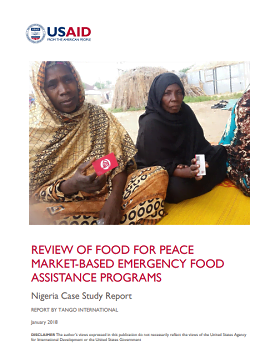Review of Food for Peace Market-Based Emergency Food Assistance Programs: Nigeria Case Study Report
Nigeria is an example of food assistance in a conflict situation in the Sahelian context. The response used information technology to deliver one of the more sophisticated applications of voucher programs. This case is a good example of proactive implementing partner (IP) mechanisms and monitoring systems to help detect and prevent fraud in a highly insecure context. It also demonstrates how humanitarian actors shifted modalities in response to the dynamic security and market conditions. The early response primarily provided in-kind food to newly accessible communities, and as the markets began functioning again, Food for Peace (FFP) saw the opportunity to transition to market-based assistance. Urban areas with functioning markets used e-vouchers, some with biometrics and technologies that provided efficiencies for beneficiaries and IPs, such as including “wallets” in the voucher that could be used for cash or non-food items. In some areas with functioning markets IPs chose to use mobile money due to ongoing insecurity in surrounding areas. This case also illustrates a high degree of collaboration between FFP, Office of Foreign Disaster Assistance (OFDA), and IPs.



